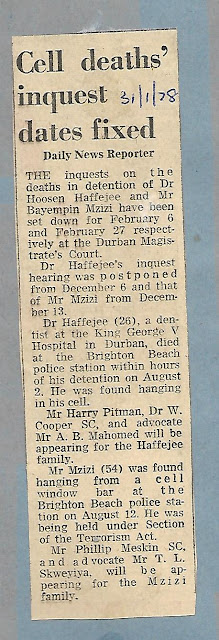Tuesday, October 2, 2018
THE RE-OPENING OF THE INQUEST INTO THE BRUTAL MURDER OF DR HOOSEN HAFEJEE IN POLICE CUSTODY IN DURBAN 41 YEARS AGO IS LONG OVERDUE
THE SECURITY BRANCH OFFICERS RESPONSIBLE FOR HIS MURDER MUST BE BROUGHT TO JUSTICE IF THEY ARE STILL ALIVE
Oct 2 2018
By Subry Govender
When on August 3 1977 Dr Hoosen Hafejee, a dentist trained at the Nagpur University in India, was found dead at the Brighton Beach police station only four hours after being detained, I was at this time based at the Daily News at 85 Field Street in Durban.
I received a call from his brother, Mr Yusuf Hafejee, who telephoned from his home town in Pietermaritzburg to inform me of the shocking death of his newly-trained doctor brother.
I immediately informed my news editors, David James, about yet another shocking death in police custody. It was reported at that time that Dr Hafejee was the 41st person to have died under police custody since the early 1960s.
Mr James advised me to obtain and check all the information regarding Dr Hafejee’s death. We published our first story on the same day on August 3 1977 and I continued to keep in contact with Mr Yusuf Hafejee for all the follow-ups.
The security branch at that time were ruthless and even detained and interrogated Dr A D Gangat and his wife, Dr Fatima Sakoor, about their connections with Dr Hafejee and what they knew about him. Dr Gangat studied with Dr Hafejee at the Nagpur University and apparently Dr Hafejee had contacts with the ANC in exile.
Ten days after the death of Dr Hafejee, another local activist, Mr Bayempin Mzizi, was found hanging in a cell also at the Brighton Beach Police Station on August 13 1977. Mr Mzizi, who was 54-years-old, was found hanging from a bar of a cell window. A strip of his jacket had been torn off and was tied to the cell bars and made into a noose around his neck.
After qualifying as a dentist in India in 1974, Dr Hafejee returned home in 1975.
He started work at the King George V Hospital in Durban.
Only four hours after being detained at the Brighton Beach police station, Dr Hafejee was found hanging from the leg of his trousers, which were attached to the cell door. He was found by the duty officer at 4am on August 3 1977.
The tragedy was that the Chief State Pathologist who conducted the post-mortem, Professor L. Gordon, in his report stated that Dr Hafejee’s death was consistent with hanging.
Dr Hafejee’s brother, Yusuf, his parents and his siblings could not accept that their brother had taken his own life. Yusuf was confident that the security police had murdered his brother.
Yusuf Hafejee disclosed that there were 68 abrasions and bruises on his brother’s body. These must have been inflicted by the security branch policemen who interrogated him.
Yusuf showed me colour photographs of his brother’s body which clearly distinguished the abrasions and bruises.
In November 1977 Mr Yusuf Hafejee submitted a set of the colour photographs to Amnesty International in London to highlight the circumstances under which his brother had died. Amnesty International convened a press conference and its general secretary at that time, Mr Martin Ennals, called on the South African Government to order a thorough inquiry into the death of Dr Hafejee.
Amnesty International also informed the family that it would make arrangements for a top Danish Pathologist, Dr Sigurd Riebur Albrectson, to come to South Africa in February 1977 to give evidence during the inquest hearing into Dr Hafejee’s death.
The family had initiated a law-suit in December 1977 to sue the then Minister of Justice, Jimmy Kruger, but this was dropped in June 1978 after Mr Yusuf Hafejee said the family had decided it would be a fruitless exercise.
The family made the decision after they were advised that another hearing on the death of their brother would only prolong the agony of their aged parents.
But he insisted that they were sure that their brother was murdered by the security police.
“I still want to emphasise that I still believe my brother would not have taken his own life.
“He was a young professional and there was so much in life for him to live for. My family and I are convinced of this.”
Now, 41 years later, after the new democratic Minister of Justice, Michael Masutha, had signed an order for the inquest into Dr Hafejee’s death in custody in re-opened, it is hoped that the truth will be finally known.
Those responsible for his murder, if they are still alive, must be brought to justice and pay the full penalty.
I have not spoken to Yusuf Hafejee for some time but I am certain that he would like to see those responsible for his brother’s death being brought to justice. Ends – subrygovender@gmail.com
Subscribe to:
Post Comments (Atom)












No comments:
Post a Comment